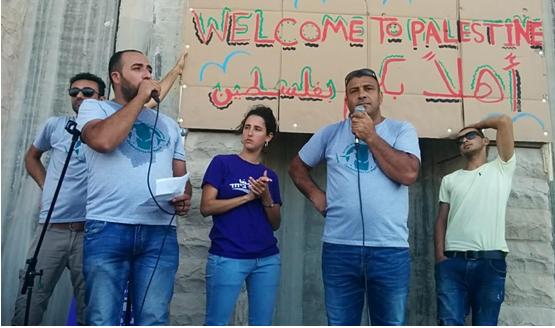Hundreds of Palestinians and Israelis marched along a major highway used by settlers in the West Bank on Friday, July 7, demanding an end to the occupation and the creation of an independent Palestinian state alongside Israel.
For two years now, “Combatants for Peace” and “Standing Together,” two Israeli-Palestinian organizations, have held nearly monthly marches along Route 60, the southern West Bank’s main north-south artery that connects Jerusalem, Beit Jala, the Gush Etzion settlements, and Hebron.

“Welcome to Palestine” – Speeches at the conclusion of the Palestinian-Israeli march on Friday, July 7 (Photo: Combatants for Peace)
Participants marched along the side of the highway, chanting against the occupation and violence and beating drums. At the end of the march, several speakers addressed the crowd.
“We stand here together, Israelis and Palestinians, who want to build peace together, standing together against the occupation, and opposing the racist discourse of separation,” said Hadash Member of Knesset Ayman Odeh, head of the Knesset’s third-largest parliamentary faction “Joint List,” said in a speech during the event. “We support the establishment of a Palestinian state for the benefit of the Palestinian people and their right to live with independence and dignity, and because it will be good for both peoples,” concluded Odeh.
“It was very moving to see hundreds of people marching here today — Jews and Arabs from Israel and the occupied territories — chanting in two languages but with one message: Israeli-Palestinian peace is for the good of both peoples,” said Suf Patishi, one of the organizers of the event from Standing Together. “We will continue to march, and we will continue to speak that message.”
“We came together because we believe that with nonviolent, joint direct action against the occupation we can change the reality here,” said in English Canadian Karen Isaacs, an organizer with anti-occupation collective “All That’s Left.” “So I say occupation is not my Judaism. Through nonviolent direct action, a world of kindness will be built here.”
Israeli Army Violence against Demonstrators Continues
Elsewhere on Friday, July 7, at Kafr Qaddum in the northern occupied West Bank district of Qalqiliya, Israeli forces injured six Palestinians and a Korean activist, during the village’s weekly march against the Israeli occupation. Popular resistance coordinator Murad Shteiwi said that Israeli forces attacked protesters and fired tear gas canisters, percussion grenades and rubber-coated steel bullets into the crowd during the march, which, according to Shteiwi, marked the sixth year anniversary of the weekly protests organized by the village. He said that six Palestinians had sustained injuries, one of whom was wounded in the head, and a female supporter from Korea was wounded with a rubber bullet. Shteiwi added that all had been transferred to Rafidia Hospital for medical treatment.
Shteiwi emphasized that after six years of organizing a march every Friday, residents of Kafr Qaddum were still determined to continue the protests until “all our goals are achieved.”
Residents of Kafr Qaddum began staging weekly protests in 2011 against land confiscations, as well as the closure of the village’s southern road by Israeli forces. The road, which has been closed for 14 years, is the main route to the nearby city of Nablus, the nearest economic center. The Israeli army blocked off the road after expanding the illegal Israeli settlement of Kedumim in 2003, forcing village residents to take a bypass road in order to travel to Nablus, thereby increasing the travel time to Nablus from the village from 15 minutes to 40 minutes, according to Israeli rights group B’Tselem.
Hundreds of Palestinians have been detained during the demonstrations since their start in 2011, and at least one protester was killed, while 84 have been injured by live fire, including 12 children, Shteiwi told the Palestinian news agency Ma’an during a similar protest last year. Some 120 others have been detained at demonstrations and were subsequently held in Israeli custody for periods ranging between 4 and 24 months.


